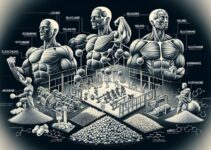You've probably heard the old adage that "you are what you eat," but when it comes to building muscle, it's more than just about what you eat – it's about how much you eat. In order to pack on lean muscle mass, you need to create a calorie surplus, but not just any surplus will do. Building muscle requires a strategic approach to your nutrition and training, and in this discussion, we'll explore six essential strategies to help you make the most of your muscle-building calorie surplus. By implementing these proven techniques, you can optimize your gains and take your physique to the next level.
Key Takeaways
- Consistently maintaining a calorie surplus is essential for muscle growth.
- Prioritize nutrient-dense foods and a variety of protein sources in your diet.
- Strategically time meals and snacks to support training and recovery.
- Pay attention to the ratios of protein and carbohydrates in your diet and consider strategic supplementation to enhance muscle recovery and performance.
Understanding Calorie Surplus
To effectively build muscle, it's crucial to understand how to create and maintain a calorie surplus. A calorie surplus occurs when you consume more calories than your body needs for maintenance, providing the extra energy required for muscle development. When you consistently maintain a calorie surplus, your body has the resources it needs to repair and build new muscle tissue. This surplus is essential for supporting the increased energy demands of intense workouts and the muscle repair process. Additionally, a calorie surplus supports nutrient absorption, ensuring that your body has the necessary vitamins, minerals, and macronutrients to promote muscle growth.
Understanding the concept of energy balance is key to achieving a calorie surplus. By carefully monitoring your calorie intake and expenditure, you can ensure that you consistently consume more calories than you burn. This positive energy balance provides the foundation for muscle development and growth. It's important to prioritize nutrient-dense foods to support muscle growth while in a calorie surplus, ensuring that your body has the necessary building blocks for optimal muscle development.
Quality Nutrition for Muscle Growth
You need to focus on quality nutrition to support muscle growth. This means prioritizing protein intake and paying attention to nutrient timing. These two factors play a crucial role in maximizing your muscle-building efforts.
Protein for Growth
Maximizing muscle growth requires consuming high-quality protein in sufficient quantities to support muscle repair and development. Protein intake plays a crucial role in providing the building blocks necessary for muscle repair after intense workouts. To optimize muscle growth, aim for a daily protein intake of about 1.6 to 2.2 grams per kilogram of body weight. This level of protein consumption ensures that your muscles have the necessary resources to repair and grow stronger. It's important to incorporate a variety of protein sources into your diet, including lean meats, poultry, fish, eggs, dairy, and plant-based options such as beans and legumes. By prioritizing protein intake, you provide your body with the essential nutrients needed to promote muscle repair and growth, ultimately maximizing your muscle-building potential.
Nutrient Timing
For optimal muscle growth and recovery, timing your nutrient intake is crucial to provide your body with the necessary fuel and building blocks. Optimal timing of nutrient intake can significantly impact nutrient partitioning, which determines whether nutrients are used for energy or for muscle-building processes. To maximize muscle growth, it's essential to strategically time your meals and snacks to support your training and recovery. Consider incorporating the following nutrient timing strategies into your muscle-building plan:
| Timing | Nutrient Intake |
|---|---|
| Pre-Workout | Carbohydrates and protein |
| Intra-Workout | Branched-chain amino acids |
| Post-Workout | Fast-digesting protein and carbohydrates |
| Before Bed | Slow-digesting protein and healthy fats |
Effective Meal Planning
When planning your meals for muscle building, focus on nutrient-dense choices and consider the timing of your meals. Aim for a balance of protein and carbs in your meals to support muscle growth and recovery. These key points will help you create an effective meal plan to maximize your muscle-building efforts.
Nutrient-Dense Meal Choices
Creating nutrient-dense meal choices through effective meal planning is essential for maximizing muscle-building potential and supporting overall health and fitness goals. When meal prepping, opt for high-calorie, nutrient-dense options such as lean proteins like chicken, turkey, or tofu, paired with complex carbohydrates like quinoa, sweet potatoes, or brown rice. Incorporating healthy snacks such as nuts, seeds, or Greek yogurt can provide additional protein and healthy fats to support muscle growth. Including a variety of colorful fruits and vegetables ensures a rich source of essential vitamins, minerals, and antioxidants. Aim for balanced meals that contain a mix of macronutrients to fuel your workouts and aid in muscle recovery. By choosing nutrient-dense foods, you can optimize your calorie surplus for muscle building while promoting overall well-being.
Timing of Meals
Maximizing your muscle-building potential and supporting your overall health and fitness goals requires effective meal planning, including strategic timing of meals. Prioritize pre-workout nutrition to fuel your body with the energy it needs for intense training sessions. Aim for a balanced meal containing carbohydrates and protein about 1-2 hours before your workout. This can include options like oatmeal with Greek yogurt, a banana with peanut butter, or a turkey and cheese sandwich on whole grain bread. After your workout, focus on replenishing your energy stores and aiding muscle recovery with a post-workout meal rich in protein and carbohydrates. This could be a protein shake with a piece of fruit, a chicken and quinoa salad, or a turkey wrap with veggies. Timing your meals around your workouts can enhance your exercise performance and recovery.
Protein and Carbs Ratios
To effectively plan your meals and optimize your muscle-building potential, pay attention to the ratios of protein and carbohydrates in your diet, ensuring they align with your fitness goals and support your overall health. When it comes to protein timing, aim to consume a good source of protein with every meal and snack throughout the day. This consistent intake of protein helps support muscle repair and growth. Additionally, focus on incorporating high-quality protein sources such as lean meats, eggs, dairy, and plant-based options into your meals. As for carbohydrate sources, prioritize complex carbs like whole grains, fruits, and vegetables to provide sustained energy for your workouts and aid in muscle recovery. Avoid excessive consumption of simple carbohydrates and processed foods, as they may lead to energy crashes and hinder your muscle-building efforts.
Strategic Supplementation for Gains
You can enhance your muscle-building efforts through strategic supplementation, optimizing your nutrient intake for maximum gains. Strategic supplementation involves timing your intake of specific supplements to support muscle recovery and performance. Incorporating pre-workout supplements can provide you with the energy and focus needed to maximize your training sessions, while post-workout nutrition is crucial for replenishing glycogen stores and initiating muscle recovery. Here's a helpful table outlining key supplements and their benefits:
| Supplement | Timing | Benefits |
|---|---|---|
| Pre-workout | 30 minutes before | Increased energy and focus during workouts |
| BCAAs | During workout | Supports muscle recovery and reduces muscle soreness |
| Whey protein | Post-workout | Fast-absorbing protein for muscle repair and growth |
| Creatine | Anytime | Enhances strength and muscle mass |
Timing Your Nutrient Intake
Timing your nutrient intake plays a crucial role in optimizing muscle recovery and growth. Understanding the optimal timing for nutrient absorption can significantly enhance your muscle-building efforts. Here are three key points to consider:
- Pre-Workout Fuel: Consuming a balanced meal or snack 1-2 hours before your workout provides your body with the necessary energy to perform at its best. Focus on including carbohydrates for fuel, protein for muscle support, and a small amount of healthy fats to sustain energy levels throughout your training session.
- During Workout Hydration: Staying hydrated during your workout is essential for maintaining performance and aiding nutrient transport to your muscles. Sip on water or a sports drink to replenish fluids lost through sweat and to support nutrient delivery to your muscles.
- Post-Workout Recovery: Consuming a combination of protein and carbohydrates within 30 minutes of finishing your workout can help kickstart the recovery process. This post-workout meal or shake replenishes glycogen stores, reduces muscle protein breakdown, and promotes muscle repair and growth.
Monitoring Progress and Adjusting
As you monitor your progress in muscle-building, remember to adjust your calorie intake and exercise routine based on the changes in your body composition and strength gains. Tracking gains is crucial to know if your current calorie surplus is effectively supporting muscle growth. Keep a record of your body weight, measurements, and strength levels to assess progress accurately. If you notice a plateau in muscle growth or strength gains, it might be time to adjust your macronutrient intake. Increasing protein intake can aid in muscle recovery and growth, while adjusting carbohydrates and fats can provide the necessary energy for intense workouts.
Furthermore, adjusting macros can help you break through plateaus. If you're struggling to make progress, consider tweaking your macronutrient ratios to find what works best for your body. It's important to be mindful of these adjustments, as they can significantly impact your muscle-building efforts. Remember that the key to successful muscle-building is not only about consuming a calorie surplus but also ensuring that these calories are supporting your muscle growth effectively. Keep tracking your progress, adjust your macros as needed, and stay consistent with your efforts to achieve optimal results.
Frequently Asked Questions
How Can I Maintain a Calorie Surplus Without Gaining Excess Fat?
To maintain a calorie surplus without gaining excess fat, focus on meal timing and macro balance. Combine this with effective training and recovery techniques. It's important to prioritize nutrient-dense foods and monitor overall calorie intake to support muscle growth.
Can I Still Build Muscle With a Calorie Surplus if I Have a Fast Metabolism?
If you have a fast metabolism, building muscle with a calorie surplus is possible. Focus on high-protein snacks and muscle-building supplements to support your fast metabolism. Consistently hitting your calorie and protein targets is key for muscle growth.
Are There Specific Foods I Should Avoid When Trying to Achieve a Calorie Surplus for Muscle Building?
When aiming for a calorie surplus for muscle building, it's best to avoid sugary snacks and processed foods. Opt for whole, nutrient-dense options like lean protein, complex carbs, and healthy fats. These choices support muscle growth and overall health.
What Are Some Common Mistakes People Make When Trying to Maintain a Calorie Surplus for Muscle Growth?
Struggling to maintain a calorie surplus for muscle growth? Common mistakes include improper portion sizes and neglecting protein. Pay attention to nutrition timing to avoid these pitfalls and optimize muscle-building potential.
Is It Possible to Overeat When Trying to Achieve a Calorie Surplus, and if So, How Can I Avoid It?
To avoid overeating, focus on balanced macros and listen to your body's hunger cues. Choose nutrient-dense foods, eat mindfully, and plan meals ahead. Pay attention to portion sizes and prioritize protein to support muscle growth while maintaining a calorie surplus.


